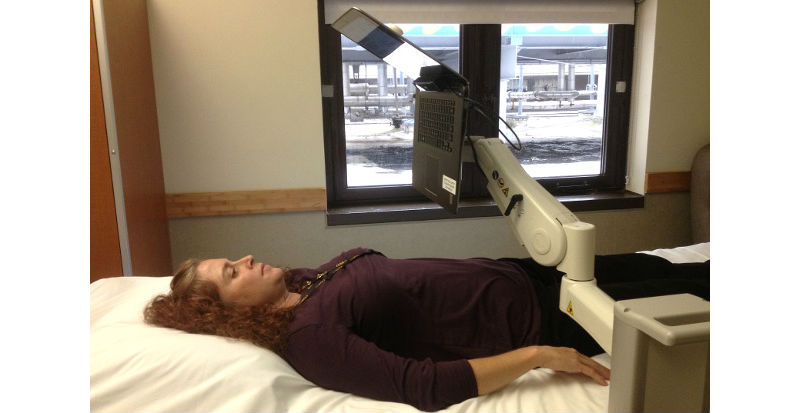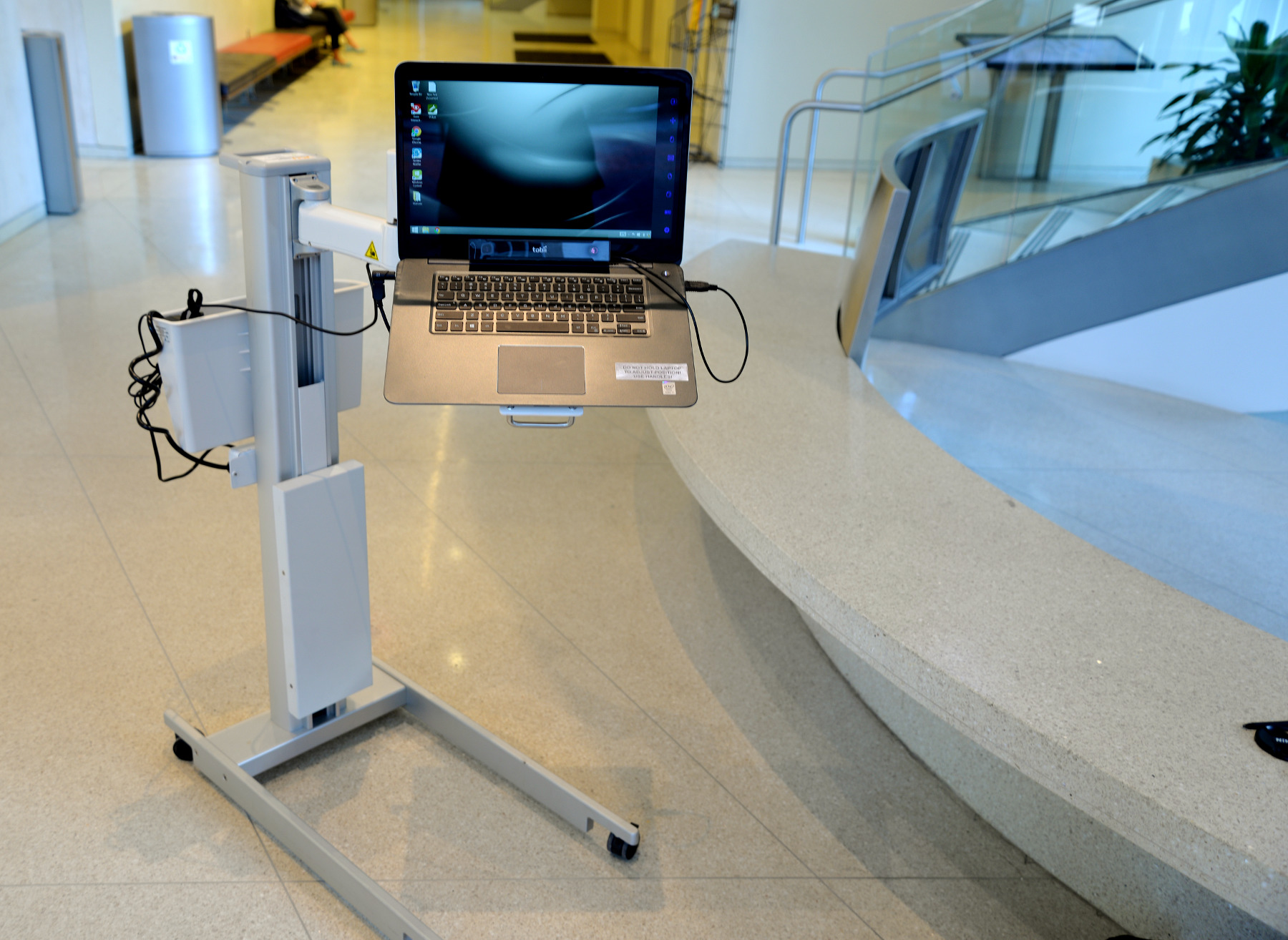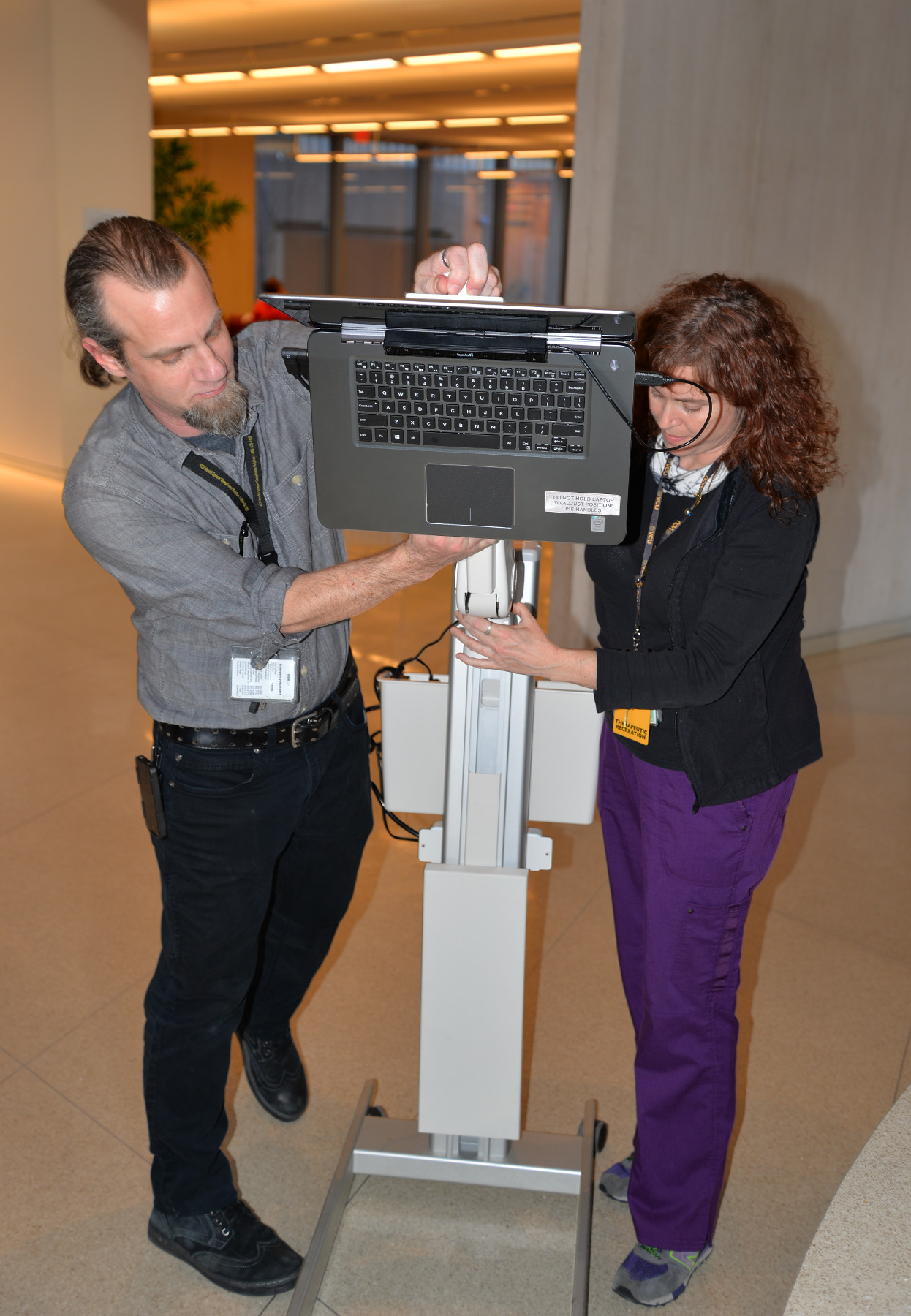The movement of limbs comes so fluidly and effortlessly for many of us that it is easy to take for granted. But those who work in the VCU Health Department of Physical Medicine and Rehabilitation know from firsthand observation that the independence that comes with mobility is a gift. That is why a VCU Health rehabilitation specialist and a technology expert teamed up to create an innovative device that gives patients with tetraplegia the ability to use a laptop with just their eyes.
Tetraplegia indicates paralysis of all four limbs or of the entire body below the neck. To accommodate patients with tetraplegia, the VCU team designed a mobile cart with an extendable arm that holds a laptop. The wheels of the device slide under a patient’s bed, and the arm extends and positions the laptop above a patient’s hospital bed. Placed just above the laptop’s keyboard is a Tobii, a thin, eye-gazer device that uses infrared technology to perform the same function as a computer’s mouse. The patient uses their eyes to select mouse functions and perform keyboard stokes.
The device allows patients to experience the normalcy of communicating via computer and it has the ability to assist people with decreased upper extremity and hand function, such as those with spinal cord injury, stroke, ALS, MS, brain injury and burn injuries, and will be available to all VCU Health patients in need. VCU Health team members said the project was fulfilling on many different levels.
“Seeing our idea become a real thing that could help increase the quality of lives, and receiving the support and enthusiasm from everyone involved who helped make this unique and simple solution a reality, was rewarding,” said John Watson, the IT technician at VCU Health who helped create the cart that holds the laptop.

Shannon Mitchell tests the mobile cart designed by VCU Health medical and IT team. (All images credit: VCU)
Watson worked with Shannon Mitchell, a recreation therapist in the Department of Physical Medicine and Rehabilitation, to design the cart. They also collaborated with Jerry Langford, a senior systems administrator for the VCU Health parasurgical unit who served as a liaison with the manufacturer, to bring the project to fruition.
Mitchell said she was initially inspired to focus on the project while working with a patient who could not medically tolerate the head of her bed to be raised. The patient required a laptop to be suspended over her and tilted toward her gaze in order to use the computer.
It was difficult.
“I fashioned a wooden easel from the occupational therapy department with a bedside table and angled the laptop until everything was aligned and we were able to calibrate her gaze,” Mitchell said. “This did not provide the security I desired or the ability to change the device’s position to meet her pressure-relief need while she was using the laptop. She would sometimes have to forgo our therapy session if the laptop could not be positioned for her use. This was a barrier for me, and as a recreation therapist it is my goal to remove barriers and return people to their greatest level of independence while increasing quality of life.”

Mobile cart designed by VCU Health medical and IT team.
That is when Mitchell began talking to John Watson about her desire to have a device that could suspend the laptop-Tobii combo securely and safely, and to be portable.
Watson used the cart base from a patient engagement table, a larger arm and other hinges and mounting hardware from the manufacturer, to create the range of motion and stability needed to position the laptop for patients.
The fact that VCU Health has the expert capacity to take on such a project distinguishes it as a frontrunner in collaborative and innovative health care, said William McKinley, M.D., VCU director of spinal cord injury medicine in the Department of Physical Medicine and Rehabilitation.
“VCU is a Level I trauma center and a regional center of excellence for the management of individuals with spinal cord injury and brain injuries,” he said. “Our expertise with these patients along with our innovative approach to maximize quality of life has allowed us to utilize and adapt state-of-the-art assistive technology in order to enhance their function.”

John Watson and Shannon Mitchell position the device designed to hold a laptop above the bed of a patient.
Additionally, if patients return home and are able to get a similar device, it then gives them independence there as well.
“For example, there are apps that allow patients to turn on the lights and television in their home. It could give them the ability to control their home environment,” Mitchell said.
VCU experts agree that because many patients with tetraplegia experience only minimal recovery in the use of their limbs, this device is an important step toward individuals regaining the confidence and self-esteem that comes with being able to increase their ability to take care of themselves.
“Individuals can recover with variable levels of independence, depending on the degree of completeness of injury and the time after injury, but many are left with permanent impairments,” McKinley said. “For any of these individuals, our goal is to maximize mobility, self-care and quality of life.”




